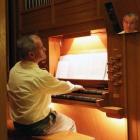"He could make the stones sing." That was his reputation at the Ecumenical Centre; never mind that the image was less than flattering to the staff who worked there. He epitomized what it meant to be an 'animateur,' that French word used in the ecumenical movement to denote something more vital than 'song leader.'
I remember when Pablo was leading the closing song of a global conference in Salvador, Brazil. We came around for another repeat, not uncommon. But with a simple wave of his hand, the intensity of the song doubled. The congregation didn't just sing louder, the song took flight as if it would never stop. A flick of his hand somehow invited a new spirit to unite us and invite those of us who would, into the dance.
Indeed, he was one of the grandfathers of what became known as 'ecumenical worship.' As part of the worship team for the WCC Vancouver Assembly in 1983, tagged as the worship assembly, he helped break open the use of songs from many cultures. But, enlarging the repertoire was only part of what he and others accomplished.
He was engaged in a creativity that not only learned from other traditions and cultures, but formed new liturgies so that the ecumenical community might participate with one another in ways formerly not thought possible. Learning by participating replaced learning by watching.
He was part of several WCC worship committees. These included not only the Vancouver Assembly, but also the Global Meetings on World Mission and Evangelism in Melbourne, Australia and Salvador, Brazil. (There are probably more times that I am forgetting.) He was part of the Global Praise team for the United Methodist Church, which disseminated global songs in the Methodist family, of which his church was a part.
He selflessly gave of himself. He was a participant and also a lecturer at several WCC worship workshops, two of which lasted a month. One cannot imagine someone of his caliber giving a month. He never dropped in on a meeting to dispense his wisdom and then return to his own tasks. He struggled and learned along with everyone else, while at the same time teaching and developing how we might worship together.
He was giving some examples of developments in Latin American liturgical music at the North American worship workshop near Toronto in 1988. He introduced us to the Sanctus from the El Salvador Mass. He noted that in the Spanish text God was accompanying the people in the song, living within their history. Even the rhythm of the song brought God closer, incarnate within the beat of the street. The music itself was part of the song's theology.
Then he asked us to sing the English translation. We were struggling ecumenists, who thought we could manage the Spanish well enough, so we kept with the Spanish. He upbraided us. Was it not possible for us to sing, 'Holy, holy,' to this rhythm? Did we find the rhythm not suitable for the English word, holy?
For him, the challenge of ecumenical worship did not end with adding some shakers and a drum; it entailed embodying the theology of another, and in the process understanding more clearly how we were shaped by our presumptions.
Rev. Pablo Sosa at the WCC Assembly in Vancouver, in 1983. Photo: WCC
His hymns and songs now reach far beyond the borders of Argentina or the confines of ecumenical meetings. His Gloria not only invites us to join the angel's song, but relishes the echoes that remain as they leave. We cannot hear Psalm 133 without humming Miren qué bueno.
He never stopped teaching nor composing. Que esta iglesia sea un Árbol was used at the Windhoek Assembly of the Lutheran World Federation. In Namibia where meeting under a tree is a common occurrence, Pablo's song re-imagines such ordinary meetings as the place where church becomes church. Yes, may our churches become like trees.
At one point he was asked to write Christmas songs from the perspective of those on the margins, one from an indigenous setting, another from the view of the homeless--Joseph and Mary finding shelter in a cardbox box, "Made in Taiwan," he noted. With such detail he grounded his songs.
A third he wrote from the perspective of a transgender prostitute, No es lo que parece, pero sí, lo es. Doesn't seem to be, but that's the way it is. The first verse in English starts, "Tell me how you did it, Jesus of the night, to transform your body, you who are the light?" How could a heterosexual, Christian male, find the words that a transgender person might say, "That's how I wish I could pray?" Such were his gifts, graciously and generously lavished on his own church community, the seminary where he taught, the wider ecumenical movement, the folk outside the normal boundary lines.
He wrote El cielo canta alegría for an outdoor church picnic. It has few words, so it could be learned on the spot. As we mourn the death of Pablo Sosa, we can also imagine that all heaven is singing for joy. In his music and in his life the glory of God was shining. And if some angel is shy, not to worry. Pablo, with a slight sweep of the hand, will invite a timid voice into the choir so they together might soar.

